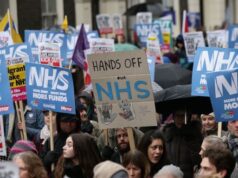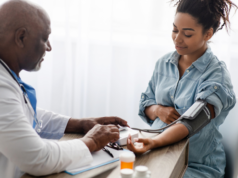Yet Another Major NHS Re-organisation: Will It Lead To Better Care Outcomes And/Or Significantly Reduced Management Costs?
On 28 May 2019 NHS North West London’s (NWL’s) Collaboration of Clinical Commissioning Groups (CCGs) published a 24 page draft document called ‘Commissioning Reform in North West London: the case for change’. This non-statutory body is proposing changes not just about who purchases care services but who manages care service delivery. Before these changes can be proposed to NHS England, the eight statutory NHS NWL CCGs will have to agree to them.
The context of this ‘case for change’ is the contents of the January 2019 NHS England’s Long Term Plan (LTP). On page 29 of the LTP it states ‘…..a single CCG for each ICS area.’ There is no business case in the LTP to support this massive organisational requirement. I can’t find a simple compelling reason in the LTP for the more than likely dismemberment of some 148 CCGs nationally. Is the case for change that after six years local CCGs have proved to be a failed initiative? In NWL it’s certainly the case that three of the eight CCGs are bankrupt. In the year 2018/19 the combined excess over expenditure of the eight NWL CCGs was £147,185,000.
We have to put this proposed reformation in the context of a chronic shortage of medical staff especially of doctors, nurses and mental health staff. There’s also the tragedy of social care being starved of money and much domiciliary care being of poor quality. We must also accept that seven years of the Acute reconfiguration transformation (‘Shaping a Healthier Future’) have ‘hollowed-out’ some of our District General Hospitals, especially Central Middlesex, Hammersmith and Ealing Hospitals.
One other truth that NHS NWL bosses still find hard to accept is that Type 1 (the most seriously ill) attendances at NWL hospital A&E units were lower in 2018/19 than they were in 2011/12. And this is over a period when the NWL population rose by 10%.
I have to point out that of the nine signatories/authors of this document, four of them were also signatories/authors of the ill-fated, £235 million 2012 NHS NWL ‘Shaping a Healthier Future’ project which was abandoned by the Department of Health on 26 March 2019.
Once, and if, all this is agreed it could become a reality on 1 April 2020 or 1 April 2021. It seems that three of the five London ‘footprints’ have decided on a 1 April 2020 start. It seems highly likely that by 1 April 2021 the current 192 CCGs across England will have been whittled down to just 44.
The Eight ‘Local’ CCGs in NWL are to be Terminated
The eight statutory NHS NWL CCGs, created in 2013 to meet the requirements of the 2012 Health & Social Care Act, are to be disbanded. However well or badly these purchasing bodies have performed over the last six years, they at least were ‘led’ by local GPs with local knowledge of the ‘town’ in which they operated.
All the CCG senior staff will no doubt lose their jobs. Losing eight CCG Chairs, CEO/COOs, HR, PR and Financial Directors will save a few £million in annual salaries alone. Or will they all be re-hired to run the eight new Integrated Care Partnerships (ICPs)? One wonders what will happen about the ’underlying’ deficit of the eight CCGs which in March 2019 stood at £99.6 million. Will it be ‘inherited’ by the new regional CCG?
And what about the 832 permanent staff employed by the CCGs ? The document speculates that ‘….there are likely to be few redundancies’. This seems hard to fathom on the face of it, as one can’t envision all or most of the staff at the eight CCGs joining the new CCG. What seems likely though is that CCG staff will move over to become ICP staff.
The annual ‘employee/workforce benefits’ in 2018/19 for all eight CCGs totalled £80.113 million. At the 19 June 2019 Ealing CCG meeting NHS NWL Accountable Officer Mark Easton quoted the total CCG cost to be £45 million. Where that figure comes from is a mystery to me. He seemed to suggest that this management cost was understandable given that NHS NWL turnover was £3 billion. He said management costs last year were reduced by 10% and that this year they would be reduced by another 10%. (There is a commitment in the document for costs to be reduced by 20%).
New NWL Integrated Care System (ICS)
The NWL ICS will, apparently be the whole care commissioning and service delivery shooting match. It appears that the 30 strong NHS NWL Health and Care System (HCS) will morph into the new NWL ICS board. Of course the NWL HCS is the re-named NWL Sustainability & Transformation Plan/Partnership (STP). In 2016, Ealing Council and Hammersmith & Fulham Council refused to sign the STP. Hence neither Council is formally represented on the NWL HCS. Will the two Councils finally relent and formally join the NWL ICS? It seems that Hammersmith & Fulham Council has concerns about the changes and has commissioned an independent review of what’s being proposed.
The graphic on page 5 states the NWL ICS will ’manage performance and £’. If this is the case, what is the new NWL CCG’s role with regard to managing performance and money? Surely the CCG is responsible for assigning priorities and purchasing all the care services for 2.2 million people? Is the CCG going to be just the purchasing department of the ICS?
A New Regional CCG (NWL CCG) Will Purchase All Care Services for 2.2 Million People in NWL
Presumably this will (like its eight predecessors) be a membership organisation. If so it will have 379 members (all the GP practices). One wonders whether the PCNs will also be members?
This ‘reform’ appears to be seriously at odds with the spirit and possibly the literal requirement of the 2012 Act for local commissioning. Will care commissioning be improved if it’s ’remote’ from the point of need, and service provisioning? Who will run this body, who will staff this body and how will the new NWL CCG bosses be chosen?
Eight New Local Integrated Care Partnerships (ICPs) Will Manage All Care Service Delivery in NWL
Presumably these ICPs will report to the new NWL CCG. No doubt local NHS Trusts, Primary Care Networks (PCNs), Local Authorities, charities, private care and voluntary organisations will variously report to these ICPs. Just how happy will these service providers be having an intermediate organisation sitting between them and the new commissioning body? Just how will this work in practice?
Apparently these ICPs will be both delegated commissioners and service provider managers. In Ealing, for example, WLNT delivers Secondary mental health and out of hospital services, LNWUHT delivers Ealing Hospital services, the seven PCNs will manage the 76 GP practices and Ealing Council supplies social services. So what will the Ealing ICP actually do? Where will the commissioning ‘split’ be made between the new CCG and each of the eight ICPs?
Is the plan to transfer many of the current local commissioning (CCG) staff to these new local service delivery (ICP) organisations? Will all these new jobs be advertised and multiple candidates interviewed? Or will staff just be transferred from one purchasing body role to a different purchasing and service delivery management organisation in the same town?
A view expressed by a senior NHS NWL executive is that these changes are aimed at ‘putting care closer to the patient’. However when this person was asked about the role of ICPs no answer at all was forthcoming.
‘…we will be moving away from the distinction between provider and commissioner’
This policy appearing on page 21 of the document really took my breath away. If this becomes reality then the 2012 Act will have been trashed. Believe me, I want the market system of separating purchaser and provider to be discontinued, but this must be done formally by Act of Parliament.
However at the 19 June 2019 Ealing CCG meeting, NHS NWL head honcho Mark Easton gave strong hints that the new CCG would delegate some of the commissioning to the new ICPs. It also came across that what the re-organisation was perhaps aiming at was more local control of service delivery (with the eight ICPs).
Healthwatch Inappropriately Described As a ‘Partner’ to ’Engage With’
The actual definition of the word ‘partner’ in a business context involves shared risk, shared profits and shared losses. Very often in the NHS this partner sharing is often non-existent. With regard to Healthwatch even the NHS’s careless use of the word is out of order. Healthwatch exists to hold NHS bodies to account. Healthwatch does not exist for NHS bodies to ‘engage’ with it. Currently some CCGs pay their local Healthwatch to deliver services. This is completely inappropriate and outrageous. Let’s hope the new NWL CCG does not pay money to its statutory ‘critical friend’.
Primary Care ‘Developments’
Many people feel Primary Care is regressing not developing. In 2012 they could get a GP appointment in days – now it takes weeks. I view with great cynicism the possibility of the aspirations being championed in this document becoming a reality anytime soon.
Page 22:
‘…GPs supported by Primary Care Networks (PCNs) in partnership with local community services, mental health and social care.’
It’s not clear what ‘local community services‘ are for a start. In Ealing, mental health and social care services are very thin on the ground and are stretched to breaking point. There’s hardly anything there to ‘partner’ with.
‘….mental health…can be managed by the local GP, practice nursing staff, community pharmacists and PCN effectively’
Anecdotally few GPs have any in-depth knowledge of mental health diagnosis and treatment. We are so far removed from GPs managing mental health that it’s really quite offensive to even propose this.
Page 23:
‘Our practices will work together in our PCNs. Our PCNs will operate through multi-discipline working delivering population health management, and support our ICPs to deliver the required health and care to our local population. These networks will be the bedrock of local/borough-level arrangements’.
I have read this through many times. Organising multi-discipline teams of staff from different organisations is difficult and expensive. Attempts to implement this team approach in NWL hospitals have largely been abandoned. Shouldn’t the ICP be supporting its PCNs? Exactly what will the relationship be between the PCNs and their ICP?
At best this motherhood and apple pie aspiration is meaningless. At worst it’s just unclear how these ICS/CCG/ICP/PCN processes and relationships are going to work at all, never mind improve outcomes and cut costs.
I’m sure there will be many more times in the coming months when we’ll hear about the virtues of ‘integration’, ‘co-commissioning’, ‘co-production’, ‘partnering’, ‘team approach’ and ‘multi-discipline’. Whether things will become any clearer is debatable. No doubt the real intentions behind creating these new structures and moving staff around into new jobs will become apparent over time.
NHS Admits That One in Eight Children Have a Mental Health Disorder: The Children’s Society Research On Waiting for Mental Health Treatment Makes Grim Reading
A quarter of 11 – 16 year-olds with a mental health disorder have self-harmed or attempted suicide. The figure rises to 46% amongst teenage girls. The Children’s Society charity has also released data obtained through Freedom Of Information research. It has discovered that in 2017, 106,000 10 – 17 year-olds were diagnosed with a mental health problem – but not treated. The target time for treatment for children is four weeks. However the research revealed that the average waiting time was 12 weeks. Even worse in some areas, children experiencing issues such as anxiety, depression and self-harm were waiting much longer – up to 364 days – for referral to first treatment. The charity is not impressed by the Government’s plans for mental health support in schools. It says as little as 20% of schools would benefit from the planned pilots.
Early Intervention Services For Children’s Mental Health Have Been Cut in More Than One Third of England.
An investigation by the Children’s Commissioner has revealed that prevention schemes like school counsellors, drop-in centres and online counselling designed to intervene before mental health issues become severely debilitating, even life-threatening, are now inaccessible.
Sadly children’s mental health problems and treatments have not improved much in recent years. In 2004 the Government revealed that one in 10 children in England had a diagnosable mental health problem. By 2015 the number of children being treated for mental health problems had doubled compared to 2010. In January 2018 NHS England/NHS Digital reported that the number of children self-harming was up annually by 385% over 10 years. At the same time the Department of Education reported that one in three 14/15 year old girls were suffering from a mental health illness. This was extracted from data in a 10 year study of 30,000 girls.
The Government in October 2018 announced an annual uplift of £2 billion for mental health services. In 2018/19 the annual mental health spend was £12.2 billion – around 10% of the total annual healthcare spend in England. However, the increase is dependent on the Government achieving a Brexit deal.
However one must pose the question – if this extra cash is forthcoming will it all definitely be spent on mental health services? A new regional integrated Care System (ICS) for each of the 44 English NHS ‘footprints’ is to be created. Local CCGs are to be disbanded and new regional CCGs created. At a local level new Integrated Care Partnerships (ICPs) will be set up. This effectively creates the opportunity for three levels of NHS executives to ‘slice and dice’ money available for physical health, mental health and social care.




